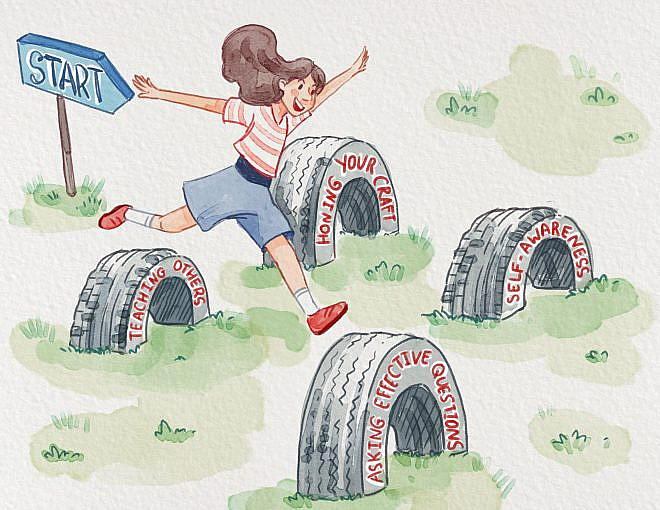This is part 2 of a series on the skills that enable data practitioners to develop consistently high impact and success. I hope that it helps individual contributors understand how to build the skills they need to drive results, and helps data managers provide clear, constructive feedback to help their team members grow. Part 1 introduced the series and focused on how critical time and feedback are to growth. Part 2 will focus on how learning itself helps you grow faster and make your entire team more effective.
In this and each future post, I’ll focus on what a particular skill area looks like when it is less developed, and what it looks like when it is well-developed. I’ll also offer some concrete suggestions on how to start improving these skills.
You’ll never stop learning; get good at it in the workplace
Across any role, in any organization, I hope you’ll always be learning new things. You may learn technical skills, how to think more strategically, how to effectively work with other humans, and much more. Even the softer skills can be learned, but beyond school you’ll primarily be in charge of learning them on your own.
As you become more skilled at workplace-based learning, it will become more effortless and independent. Your colleagues will become more comfortable handing you a big, new project confident that you will be able to learn your way into it. This ability to pick up new skills will expand the breadth of your impact dramatically. And you’ll be able to share what you’ve learned to become a multiplier within your team.
This post will focus on some of the core learning skills you’ll build as you become more experienced. These skills include:
- knowing what you know and what you don’t,
- asking effective questions,
- growing your technical skills, and
- teaching others.
Knowing what you know and what you don’t builds trust with colleagues
As you progress through your career, you will both learn more skills, and learn more about your boundaries. Your self-awareness and ability to communicate where you are to others are critical to building trust, completing projects, and aligning your work to your interests and growth opportunities.
Ideally, this self-awareness will also help you shape your workload to balance your confidence with new challenges and maximize the opportunity to find flow. When your work is too easy or repetitive, you’re bored; when you’re handed too large a challenge, you’re frustrated or you may find yourself procrastinating on getting started. Knowing and clearly communicating your skills and where you can stretch enables you to spend as much time as possible on projects that get you to that optimal balance, creating a virtuous cycle of growth and impact.
⛔ What underdeveloped skills look like
You may not speak up often enough when you do have expertise. You are capable, but those around you don’t see your skills clearly. It may be harder to get stretch projects. You may feel that you spend too much of your time working on projects that you already know how to do, and that are a bit boring.
On the other hand, you may get yourself into trouble by running too quickly into projects and decisions where you don’t yet have the experience. You don’t ask for feedback early enough, and may lock yourself into an approach before you’ve done enough research or even fully defined the requirements of your project, and ultimately struggle to achieve your goal. Or, you may get stuck in frustrating loops where you work too long without feedback, and feel you are constantly re-working your projects.
✅ What highly developed skills look like
You contribute confidently to conversations, decisions, and projects where you have expertise, and you are open about where you do not. That doesn’t mean you don’t take on stretch projects – just that you are open about what you need to learn, spend the time you need to research, and have strong intuition for when to ask questions and get feedback on your approach.
A note on impostor syndrome
Impostor syndrome is real. Many people regularly feel that they don’t have the skills they should for a project, and that they aren’t capable. When you feel like an impostor, it can be incredibly difficult to have confidence in your skills and handle your limitations gracefully. A few tips for growing more confident in what you have to offer your team include:
- asking for feedback from others, and believing positive feedback
- reminding yourself that everyone suffers from imposter syndrome at some point
- remembering that the folks who asked you to take on this project believe in your capabilities to complete it, and
- looking back on all the other times you felt like you were in over your head and ended up completing a project.
It’s absolutely normal to feel this way, but over time it gets easier to recognize the feeling and put it aside as you work through the project. You are capable, and consciously stretching out of your comfort zone can help you grow more confident in what you have to offer.
📈 How to develop this skill
A few approaches to growing your self-awareness and communication of skill boundaries include:
- If you struggle with speaking up when you do have expertise, remember that folks around you are constantly learning too. Try volunteering for a project while acknowledging which areas make you nervous. Work with your team to get early feedback on your approach to build confidence in your ability to complete it.
- If you struggle with over-reaching on projects, spend some time at the beginning of a project identifying what is new, or what looks like projects where you struggled in the past. Come up with a plan to get feedback from your team early on those pieces.
- Make time for mini-retrospectives after each project. Ask yourself and your stakeholders what could have gone better. Remember that data work is not linear and you can’t always expect to get to the solution on the first try, but try to notice patterns in your own projects.
- Keep learning about the tools and techniques you leverage in your work. Knowing what is possible may not immediately make you an expert, but it can unlock higher self-awareness and contribute to your success. Even if you have never optimized a sql query, knowing that performance matters and query optimization exists might help you see possible areas where you will need support before you embark on a project that requires writing particularly complex queries.
Asking effective questions accelerates your progress
Asking good questions, at the right time, will help you accelerate your projects and technical skill growth. It will help build trust with your colleagues, because they’ll know that no news is good news, and if you need their input they’ll hear from you.
⛔ What underdeveloped skills look like
You may ask questions too quickly, denying yourself the opportunity to struggle and learn and potentially wearing out your manager or peers. You might default to asking questions in your team Slack that could be answered with a quick Google query or review of existing internal documentation. You may ask questions but not get good answers because your questions are overly open ended, unclear, or you may be asking questions about the question, not the actual problem.
Or, you may wrestle at a dead end too long before asking for help, slowing you down when a couple of pointed questions could get you back on track.
✅ What highly developed skills look like
You know how long to try to search before asking for help. You know that building research skills will grow your independence – but you don’t let yourself lose too much time when you really just need a nudge. You ask clear questions that show you’ve done some work to understand the problem before reaching out. You may come to a community of peers, like a Slack community, rather than your manager to get some kinds of input.
📈 How to develop this skill
A few approaches to ask better questions include:
- Start with the resources your company has made available. Search in company documentation and Slack to see if you can get more context or any easy answers.
- If the question is about your tools instead of your internal data or processes, try Googling before you ask questions. Because of the way Google results improve based on the resources you use often, initially your results may truly be worse than your teammates. If you struggle to find relevant information, append more specific sources to your queries like “AWS docs” or “stack overflow.”
- Create a rule of thumb for yourself that pushes you to stretch, but not too long. For newer practitioners or for experienced folks in a new role, that might be to spend at least 20 minutes trying to unblock yourself on a technical issue before you ask for help, but don’t struggle alone for more than an hour without asking for help. As you gain experience and take on more complicated projects those timelines might grow longer, but setting your expectations of what is reasonable ahead of time will help you calibrate.
- Don’t be afraid to ask questions when you hit that limit you’ve set for yourself. Ten years into my data career, I still ask my team questions constantly about how things work, whether X has changed since the last time I looked at it, if a counterintuitive result makes sense to others. You are never too senior or too independent to ask questions.
- When you ask questions, make sure you’ve done some research first, and be very specific about what you know and what you don’t. “What does reply_time_in_minutes__business mean?” is overly vague – it doesn’t help your team understand the context at all and is likely to get you an unhelpful response. On the other hand, “I’m trying to understand reply_time_in_minutes__business. I looked in the dbt code and I see it’s coming in directly from Zendesk, but I don’t know what our support team’s business hours are. How do I find that out?” makes it clear what you’ve done, what’s blocking you, and what you’re trying to do with the answer. I’d estimate that at least a third of the time when I think I want to ask a question, I end up answering it as I do the work to try to craft it into a GOOD question. Julia Evans has written excellent posts on both asking good questions and getting good answers to those questions.
- Build your brain trust and leverage folks outside of your own team to get different points of view on how to proceed. Many tools have Slack communities for tool-specific advice, and Locally Optimistic has both tool channels and more general channels that are great for talking through overall approach or organizational challenges.
Growing your technical skills creates new opportunities for impact
You’ll constantly learn more about the tools and techniques you apply within your data craft. Consciously thinking about your learning approach will enable you to build skills more quickly and effectively. A strong learning framework will allow you to build both breadth and depth of knowledge and skills.
⛔ What underdeveloped skills look like
You’re primarily learning new skills and techniques through your day to day work, focusing on the tools already most commonly used in your organization. You likely rely heavily on your teammates as resources, though you also do some independent research when needed. You may also be still learning how you learn best. Does a new skill stick better when you read a book, watch a tutorial video, or build a sample project? It may take you several attempts to learn a new skill or technique as you test learning styles.
Or, you may learn skills solely because they’re interesting to you, but you have trouble applying them to your work. You learn the basics of many tools or techniques but either struggle to find opportunities where they make sense for the organization you’re supporting or apply them in ways your stakeholders don’t ultimately find helpful.
✅ What highly developed skills look like
You’re consistently, proactively learning about your space. You subscribe to newsletters, engage in related communities, and have built a network of colleagues outside your day to day coworkers who you can reach out to for suggestions. You are aware of new tools and techniques, and are able to call upon them when a relevant application arises in your work, even if you don’t have deep expertise yet. You know how to efficiently teach yourself something new and ensure the skills stick. It may take several projects to feel confident in your new skills, but you can tell you’re making progress as you go.
📈 How to develop this skill
A few approaches to growing your learning toolkit include:
- Make good friends with the docs for the tools you use every day. I spent nearly 10 years using Redshift daily and referred to the docs regularly the entire time. It’s worth reading through the doc structure or table of contents to understand the types of things they cover, and proactively read sections that sound interesting to you. Knowing how to quickly traverse the docs helps you not waste brain space on whether this particular database uses DATE_TRUNC(), DATETRUNC(), or TRUNC(date), even if that means you look it up regularly (✋).
- Think critically about how you learn best. Are you a reader, a watcher, a doer, a talk-it-througher, or a combination of several of those? Know how you learn best and lean into those modalities. You’ll quickly find good resources that support your preferred learning method.
- Find a couple of people who are interesting to you to follow. Based on your preferred media types, you can find smart data folks writing newsletters, Substacks, or books; recording podcasts or Youtube videos; having interactive discussions on Slack or Twitter . . . you have options. It’s good to focus on deep topic-based learning when you have a specific challenge, but even better to consume a variety of things over time to start to build your mental map of the space. Context is incredibly valuable in technical domains, so building up lots of general context is often helpful in ways you can’t predict.
- Take advantage of learning opportunities within your organization, even those outside of your team. Ask to be invited to lunch-and-learns with other teams to learn more about their crafts; if a topic is particularly interesting to you, ask for a reading suggestion so you can learn more.
- If there aren’t formal learning opportunities within your company, create informal ones. Choose a topic you’re interested in learning more about, invite your team or other folks who might know more about it, and facilitate an informal lunch discussion where everyone comes together to share, without a prepared presentation.
- Identify other folks within your organization (or outside it) who have a skill you’d like to learn, and ask if they are open to a short conversation about that topic. Ask them for resources that might accelerate your learning as well.
Teaching others multiplies your impact
As you become more senior, your role becomes much more about becoming a force multiplier rather than simply being a strong independent contributor. Mentorship, sponsorship and training become a larger part of your role. Teaching others also helps you cement your own learning and uncover gaps in your understanding.
⛔ What underdeveloped skills look like
You are primarily focused on your personal learning and doing to expand your impact. You are progressing personally, but you may miss opportunities to share what you’ve learned with others and amplify the impact. You may believe that what you’re learning is either too basic or too specific to be worth teaching others, and rather than think through how to make it applicable to others, you leave valuable learning locked up in your head. The work you encourage your teammates to take on looks like work they’ve succeeded with before, rather than projects that will stretch their skills.
✅ What highly developed skills look like
You thoughtfully and proactively share what you’ve learned to give others on the data team an opportunity to leapfrog and accelerate their learning. You document what you’ve learned for future team members. You think through how your learnings and discoveries might benefit other stakeholders and team members. Your peer reviews are thoughtful, constructive, and focus on design and other big picture comments that drive real growth and improvement. You notice when a teammate could grow from a project you are working on, and find ways to include them.
📈 How to develop this skill
A few approaches to practice teaching others include:
- Write and improve internal documentation, and then share it with your team. When you’re new to a team or a role, you’re learning a ton. Don’t waste the opportunity to write it down and share it with the next person to come along.
- Write about something else! Clear and effective written communication skills will help you teach others, but you can improve your writing by writing about any topic. Work-related or not, make writing a habit and ask for feedback about your writing.
- Share your work with your peers and others. A quick Slack message about the project you just completed helps them better understand what has been done and opens the door to folks asking questions about it.
- Remember that teaching others isn’t limited to focusing on successes or sharing new ways to do something. Sharing failures and approaches that didn’t work out, and what you learned from them, can help your team accelerate learning (and build a healthy culture where it’s safe to fail as well).
- Participate in learning opportunities hosted by your team or externally. Even a 5 minute lightning talk about a small project is good practice!
- Engage with your peers’ pull requests. Learn about what makes a good peer review and focus on the areas where you’re confident you can add value. Over time you’ll be adding more and more useful feedback for your teammates.
Growing your impact takes time
I actually can’t repeat this enough, though I’ll say it in every one of these posts. Time and feedback are the keys to growing in your role. If you see yourself reflected in one of these descriptions of an underdeveloped skill, that’s great! You know a specific area you can focus on, and an area where you can ask for feedback and opportunities to practice. My biggest goal with this series is to help you add specificity to conversations about growth opportunities, which I hope you’re already having with your manager. The more specific you can be on your area of focus, the easier it is to accelerate your progress.
Up next is a post about applying your technical skills for maximum impact. And as always, let’s chat about this in LO’s slack community. I would love to hear more about how your approach to learning has evolved over time.






